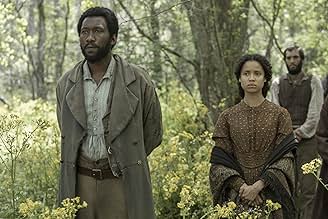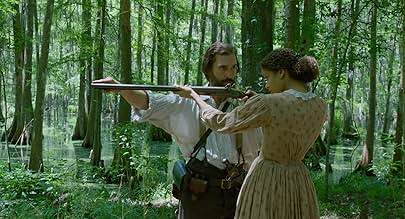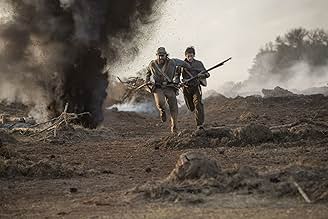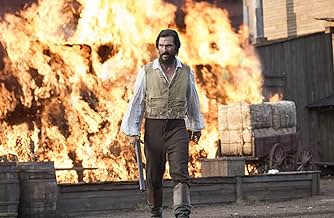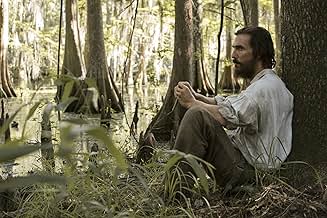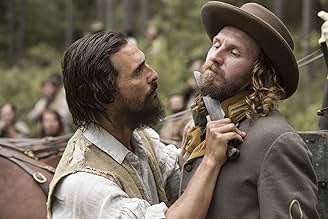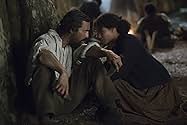Un desilusionado desertor del ejército confederado regresa a Mississippi y lidera una milicia compuesta de otros desertores y mujeres en un levantamiento contra el corrupto gobierno confeder... Leer todoUn desilusionado desertor del ejército confederado regresa a Mississippi y lidera una milicia compuesta de otros desertores y mujeres en un levantamiento contra el corrupto gobierno confederado local.Un desilusionado desertor del ejército confederado regresa a Mississippi y lidera una milicia compuesta de otros desertores y mujeres en un levantamiento contra el corrupto gobierno confederado local.
- Premios
- 3 premios ganados y 4 nominaciones en total
Jessica Ann Collins
- Annie
- (as Jessica Collins)
Donald Elise Watkins
- Wilson
- (as Donald Watkins)
Argumento
¿Sabías que…?
- TriviaIn 2016 a document was discovered in the National Archives which was a request by Newton Knight's company to join the Union Army in 1864. It lends validity to Knight's claims.
- ErroresWhen the plantation owner comes back home after the war and walks through the front door, a thermostat is visible on the wall to his left.
- Citas
Will Sumrall: [referring to Daniel] He died with honor.
Newton Knight: No, Will, he just died.
- ConexionesFeatured in The History of Jones County (2016)
- Bandas sonorasBeautiful Dreamer
Written by Stephen Foster
Opinión destacada
"Free State of Jones" is a moving, authentic, important film. Matthew McConaughey gives an Oscar-worthy performance as Newton Knight, an historic figure. I forgot I was watching Matthew McConaughey and felt that I was watching Newton Knight. I've really never seen a performance quite like McConaughey's here. His Newt Knight is the most manly man in any room – or swamp – and yet he is also as tender as a mother.
In the early Civil War battle scenes, he plays a nurse. Knight is not shown mowing down the enemy with impressive, explosive gunfire. Rather, he is shown risking enemy fire in order to save men's lives, or to retrieve and bury the corpse of a boy shot in battle on his first day. My tears flowed freely during these scenes. Later, Knight himself cries after one of his men is hanged. But Knight gets his revenge, an eye-for-an-eye revenge scene that I won't soon forget.
Newton Knight was a white Mississippi farmer. He was the grandson of a slaveholder, but Knight owned no slaves himself. He served in the Confederate army, but deserted in 1862, after serving for almost a year. He was outraged by the Twenty Negro Law, that allowed families who owned twenty slaves to exempt one family member from service for every twenty slaves they owned.
Knight and other deserters formed The Free State of Jones, declaring their loyalty to the Union, and flying the stars and stripes rather than the stars and bars. After the war, Knight worked for Reconstruction and married Rachel, a freed slave woman. His children also married cross-racially. He died in 1922. As might be expected, he is a controversial figure in Mississippi. Fans of the Confederacy denounce him as a traitor. Others celebrate him as one white Southerner who had a conscience and resisted white supremacy.
Newt Knight was clearly someone with a bucketload of charisma. His power inspired men to fight to the death against their own nation. McConaughey radiates charisma in this role. He is masterful and yet intimate. I'd follow this Newt Knight into battle and feel proud to do so.
"Free State of Jones" is receiving negative reviews. It's easy to see why. There is something in this film to anger multiple grievance mongers.
First, race hustlers will hate this movie. Race hustlers want the official story to be that all whites are supremacists and all blacks are heroic. A film that depicts a white man who worked for black rights is taboo. Race hustlers anathematized "Mississippi Burning" and "The Help" for the same reason. Such a shame that the race hustlers' ideological blindfolds make it impossible for them to appreciate great art.
Liberals might hate this film for a couple of other reasons. I don't know if I've seen a movie where almost every scene hinges on how guns are used. Almost everyone is armed, and uses those weapons to keep breathing and to settle disputes. Even little girls have guns and use them heroically. Second amendment fans may love this film. It depicts what they dream of: oppressed citizenry taking up arms to defeat their own government.
In addition to clinging to their guns, these rebels cling to their God and their Bibles. This is one of the most religious American films I've seen in a while. It's an historical fact that Newt Knight was a devoutly religious Primitive Baptist – he didn't drink, for example. The film drives home Knight's Christianity. He is shown in a long scene using a quill to record a birth in his Bible. In one heartbreaking scene, a slave who has been sexually molested survives psychologically by reciting verses from Genesis. "Free State of Jones" practices a muscular Christianity. One eye-for-an-eye scene takes place in a church.
Republicans will be torn about "Free State of Jones." On the one hand, Knight, like many populist leaders, preaches against economic inequality. "No man should be poor just so that someone else can be rich." I can hear theater seats squeak as Republicans head for the exits. Knight's words, though, reflect the facts. Poor white Southerners were sabotaged by the slave economy and they knew it. That's why they deserted.
But Republicans, if they sit through the entire film, will see how the Republican Party was the favored choice of freed slaves in the post-Civil-War era.
There is a narrative problem in the film. The viewer expects "Free State of Jones" to end after the Civil War. I actually began tying my sneakers, readying to leave the theater. But the film keeps going in what feels like an anti-climax. Gary Ross, the filmmaker, wants to make a point: the Civil War was *not* the happy ending. The KKK rose up, and Jim Crow became entrenched. Black men who tried to exercise their right to vote were lynched. This is an important point, but the film should have been better structured so its narrative flow didn't stop before the film itself did.
"Free State of Jones" was clearly made by sticklers for authenticity. Everyone looks dirty and tired. The clothes look like clothes people wore in the nineteenth century. A confederate officer's uniform looks baggy and tacky, not sparkling and admirable. Scenes are shot in lamplight. I loved this aspect of the film, as will Civil War re-enactors.
In the early Civil War battle scenes, he plays a nurse. Knight is not shown mowing down the enemy with impressive, explosive gunfire. Rather, he is shown risking enemy fire in order to save men's lives, or to retrieve and bury the corpse of a boy shot in battle on his first day. My tears flowed freely during these scenes. Later, Knight himself cries after one of his men is hanged. But Knight gets his revenge, an eye-for-an-eye revenge scene that I won't soon forget.
Newton Knight was a white Mississippi farmer. He was the grandson of a slaveholder, but Knight owned no slaves himself. He served in the Confederate army, but deserted in 1862, after serving for almost a year. He was outraged by the Twenty Negro Law, that allowed families who owned twenty slaves to exempt one family member from service for every twenty slaves they owned.
Knight and other deserters formed The Free State of Jones, declaring their loyalty to the Union, and flying the stars and stripes rather than the stars and bars. After the war, Knight worked for Reconstruction and married Rachel, a freed slave woman. His children also married cross-racially. He died in 1922. As might be expected, he is a controversial figure in Mississippi. Fans of the Confederacy denounce him as a traitor. Others celebrate him as one white Southerner who had a conscience and resisted white supremacy.
Newt Knight was clearly someone with a bucketload of charisma. His power inspired men to fight to the death against their own nation. McConaughey radiates charisma in this role. He is masterful and yet intimate. I'd follow this Newt Knight into battle and feel proud to do so.
"Free State of Jones" is receiving negative reviews. It's easy to see why. There is something in this film to anger multiple grievance mongers.
First, race hustlers will hate this movie. Race hustlers want the official story to be that all whites are supremacists and all blacks are heroic. A film that depicts a white man who worked for black rights is taboo. Race hustlers anathematized "Mississippi Burning" and "The Help" for the same reason. Such a shame that the race hustlers' ideological blindfolds make it impossible for them to appreciate great art.
Liberals might hate this film for a couple of other reasons. I don't know if I've seen a movie where almost every scene hinges on how guns are used. Almost everyone is armed, and uses those weapons to keep breathing and to settle disputes. Even little girls have guns and use them heroically. Second amendment fans may love this film. It depicts what they dream of: oppressed citizenry taking up arms to defeat their own government.
In addition to clinging to their guns, these rebels cling to their God and their Bibles. This is one of the most religious American films I've seen in a while. It's an historical fact that Newt Knight was a devoutly religious Primitive Baptist – he didn't drink, for example. The film drives home Knight's Christianity. He is shown in a long scene using a quill to record a birth in his Bible. In one heartbreaking scene, a slave who has been sexually molested survives psychologically by reciting verses from Genesis. "Free State of Jones" practices a muscular Christianity. One eye-for-an-eye scene takes place in a church.
Republicans will be torn about "Free State of Jones." On the one hand, Knight, like many populist leaders, preaches against economic inequality. "No man should be poor just so that someone else can be rich." I can hear theater seats squeak as Republicans head for the exits. Knight's words, though, reflect the facts. Poor white Southerners were sabotaged by the slave economy and they knew it. That's why they deserted.
But Republicans, if they sit through the entire film, will see how the Republican Party was the favored choice of freed slaves in the post-Civil-War era.
There is a narrative problem in the film. The viewer expects "Free State of Jones" to end after the Civil War. I actually began tying my sneakers, readying to leave the theater. But the film keeps going in what feels like an anti-climax. Gary Ross, the filmmaker, wants to make a point: the Civil War was *not* the happy ending. The KKK rose up, and Jim Crow became entrenched. Black men who tried to exercise their right to vote were lynched. This is an important point, but the film should have been better structured so its narrative flow didn't stop before the film itself did.
"Free State of Jones" was clearly made by sticklers for authenticity. Everyone looks dirty and tired. The clothes look like clothes people wore in the nineteenth century. A confederate officer's uniform looks baggy and tacky, not sparkling and admirable. Scenes are shot in lamplight. I loved this aspect of the film, as will Civil War re-enactors.
- Danusha_Goska
- 25 jun 2016
- Enlace permanente
Selecciones populares
Inicia sesión para calificar y agrega a la lista de videos para obtener recomendaciones personalizadas
- How long is Free State of Jones?Con tecnología de Alexa
Detalles
- Fecha de lanzamiento
- País de origen
- Sitios oficiales
- Idioma
- También se conoce como
- Free State of Jones
- Locaciones de filmación
- Productoras
- Ver más créditos de la compañía en IMDbPro
Taquilla
- Presupuesto
- USD 50,000,000 (estimado)
- Total en EE. UU. y Canadá
- USD 20,810,036
- Fin de semana de estreno en EE. UU. y Canadá
- USD 7,572,206
- 26 jun 2016
- Total a nivel mundial
- USD 25,035,950
- Tiempo de ejecución2 horas 19 minutos
- Color
- Relación de aspecto
- 1.85 : 1
Contribuir a esta página
Sugiere una edición o agrega el contenido que falta

Principales brechas de datos
By what name was Lucha por la libertad (2016) officially released in India in Hindi?
Responda






